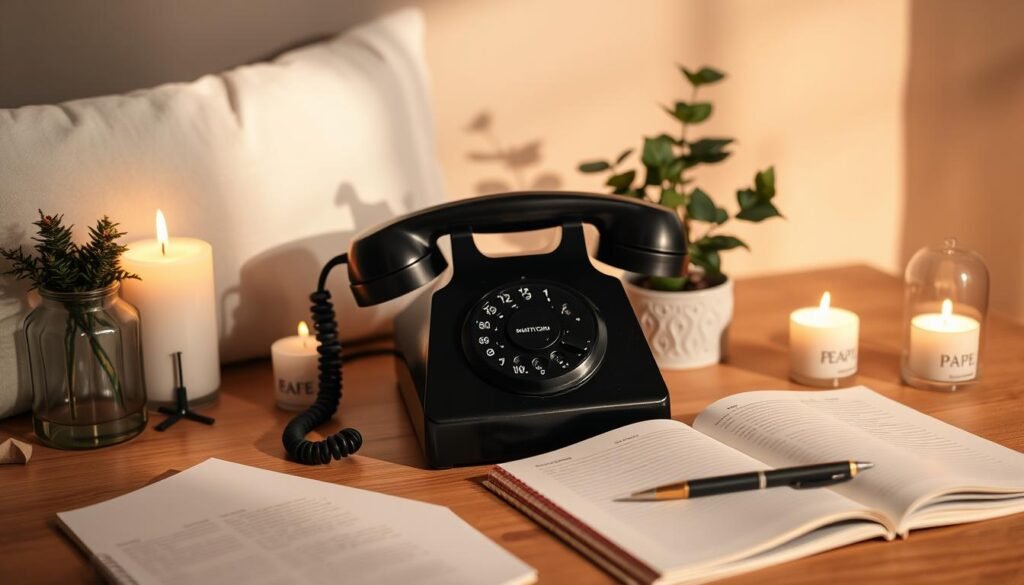Did you know about 18% of people in the United States struggle with anxiety disorders? This shows that many face daily battles due to anxiety. Knowing how to handle this mental health issue is key, with lots of resources out there for guidance and help.
Anxiety shows up at any age, bringing symptoms like too much worry, panic attacks, and feeling uncomfortable socially. It’s important to ask for help. Treatments like Cognitive Behavioral Therapy (CBT) and certain medicines can really help. This article will talk about mental health support, ways to cope, and advice from experts for those dealing with anxiety.
Key Takeaways
- Anxiety disorders affect up to 18% of the U.S. population.
- Experts recommend Cognitive Behavioral Therapy and medication as effective treatments.
- Seeking professional help is essential when anxiety impacts daily activities.
- You can find support through various anxiety resources, including apps and podcasts.
- Understanding anxiety symptoms is the first step toward effective management.
Understanding Generalized Anxiety Disorder (GAD)
Generalized Anxiety Disorder, or GAD, is a big problem for many. It’s a common mental disorder in the United States. People with GAD have strong, ongoing anxiety. This anxiety affects their daily life and happiness. Knowing more about GAD helps in finding the right ways to deal with it.
Definition and Overview
GAD means having lasting worry and anxiety about everyday things. Those with GAD worry a lot for months or years. This worry often starts when they are young adults, but kids can have it too. It’s more common in women than men. Genetics might also play a part in getting GAD.
Common Symptoms of GAD
The signs of GAD include:
- Worrying too much about different parts of life
- Feeling restless and finding it hard to relax
- Being tired and unable to focus well
- Having trouble sleeping, like insomnia
- Suffering from muscle tension and headaches
For a diagnosis, these signs must be there most days for at least six months. They need to cause a lot of stress or problems in work, social life, or other important areas.
Treatment Options
Treating GAD usually involves several methods. Doctors may prescribe antidepressants or anti-anxiety meds, such as buspirone. Buspirone is less likely to be addictive compared to other drugs. Cognitive Behavioral Therapy, or CBT, is a top choice for therapy. It really helps lessen anxiety. While Acceptance and Commitment Therapy, or ACT, is newer and lacks a lot of evidence, some find it useful.
Making good lifestyle choices also helps treat GAD. Cutting down on caffeine and getting enough sleep are good steps. Mindfulness and regular exercise can lower stress. These improve mental health overall.
| Symptom | Description |
|---|---|
| Excessive Worry | Pervasive anxiety about daily life activities. |
| Restlessness | Inability to relax or sit still. |
| Fatigue | Persistent tiredness, often unrelated to physical activity. |
| Concentration Difficulties | Struggles with focus and mental clarity. |
| Sleep Problems | Issues related to falling or staying asleep. |
Essential Anxiety Resources for Immediate Support
When anxiety strikes, finding help fast is key. There are many resources for quick support, like hotlines and online groups. You can talk to professionals or others who know what you’re going through. This helps you feel less alone and more hopeful.
Emergency Hotlines for Crisis Situations
Emergency hotlines are a lifeline in tough times. The National Suicide Prevention Lifeline is available all the time. There are also helplines from the Substance Abuse and Mental Health Services Administration to help with anxiety. For in-person help, places like the walk-in center at 4643 Wadsworth Blvd in Wheat Ridge, CO, are there for you.
Online Support Communities
Feeling connected is important when you’re dealing with anxiety. Online groups on Reddit and Facebook let you talk about what you’re facing. You can get advice and learn from others in the same boat. Websites with mental health forums offer a space to share and find comfort and useful info.

| Resource Type | Key Features | Contact Information |
|---|---|---|
| Emergency Hotline | 24/7 assistance, trained counselors | 1-800-273-TALK (1-800-273-8255) |
| Walk-in Center | In-person support, immediate crisis intervention | 4643 Wadsworth Blvd, Wheat Ridge, CO 80033 |
| Online Community | Peer support, shared experiences, discussion forums | Reddit: r/anxiety, Facebook support groups |
Using these mental health resources can really help anyone with anxiety. They provide the support you need to handle your struggles better.
Effective Coping Strategies for Anxiety Management
Having strategies to handle anxiety is very important. These tools help people deal with their daily life better. They can feel more in control and less stressed. This part talks about two helpful ways: breathing ways and writing in a journal.
Breathing Techniques and Exercises
Using deep breaths can make a big difference when you’re anxious. It helps you calm your mind and control your feelings. The 5-4-3-2-1 method is one good way to focus on other things, not your worries.
It makes you notice things like what you see or hear. A simple trick of counting while breathing deeply works well when you’re stressed out. Doing regular exercises, like walking or running, is also great. It makes you feel happier and less anxious.
Journaling for Emotional Clarity
Writing in a journal is another way to deal with anxiety. It lets you understand your feelings better. Studies show that this can really help reduce anxiety over time. When you write down what stresses you, you start noticing patterns. This helps you know what makes you anxious.
Having friends and family who support you is very helpful. Being part of a community gives you even more support and resources. It’s good to keep in touch with people. They can help you keep writing in your journal regularly.
Making these methods a part of your life can really improve how you handle anxiety. Try to do breathing exercises and journal every day for the best effect.

| Strategy | Benefits | Recommended Practices |
|---|---|---|
| Breathing Techniques | Reduces stress, calms the mind | Deep breathing exercises, grounding techniques |
| Journaling | Enhances emotional clarity, tracks triggers | Daily writing, reflecting on feelings |
| Physical Activity | Boosts mood, reduces anxiety | Moderate intensity exercise, 2½ hours weekly |
| Support Networks | Provides emotional support and accountability | Connect with friends, family, community |
Mental Health Support Through Therapy Options
It is crucial to find effective therapy options for anxiety relief. These methods offer the support needed to ease symptoms. Cognitive Behavioral Therapy (CBT) is especially effective. It changes negative thought patterns and actions linked to anxiety.
Cognitive Behavioral Therapy (CBT)
Cognitive Behavioral Therapy takes an active approach in therapy. It works by helping those suffering identify and tackle harmful thoughts. Through techniques like cognitive restructuring and mindfulness, mental health improves significantly. Cognitive Behavioral Therapy boosts coping skills, tackling the constant worries characteristic of anxiety disorders.
Telehealth Therapy Availability
Telehealth has changed how we access mental health care. Now, therapy is more available than before. People can meet with therapists online, removing the hurdles of distance and travel. This means that anyone can get therapy from wherever they are.

The mix of CBT and telehealth offers new ways to deal with anxiety. Good mental health support is now easier to get, leading to better overall mental health.
Self-Care Techniques to Reduce Anxiety
Practicing self-care is key to reducing anxiety and boosting well-being. Paying attention to your diet and exercise can help a lot. These simple steps can make a big difference in lowering anxiety.
Nutrition’s Role in Mental Health
Eating right has a big impact on how you feel. Filling your diet with whole foods like fruits, veggies, whole grains, and lean meat is great for your mood. Eating too much junk food and sugar can make stress worse. So, good nutrition makes you more emotionally stable.
Exercise and Physical Activity
Moving your body is amazing for easing anxiety. Just a quick 15-minute walk can make you feel happier thanks to endorphins. Studies have shown that regular exercise like jogging can make you feel less stressed and anxious. Yoga, too, helps with stress and boosts your mood.
| Self-Care Techniques | Benefits |
|---|---|
| Balanced Nutrition | Supports mood regulation, boosts energy levels |
| Aerobic Exercise | Reduces anxiety, increases emotional resilience |
| Yoga | Promotes relaxation, improves mental clarity |
| Mindful Eating | Enhances awareness of hunger cues, fosters healthy habits |
By adding these self-care habits to your routine, you’ll eat better and move more. Both are super important for beating anxiety and feeling good mentally.
Mindfulness Practices for Stress Relief
Adding mindfulness to daily life can make stress easier to handle. It leads to better overall well-being. These methods offer a peaceful state of mind that helps with life’s challenges.
Guided Meditation and Relaxation Exercises
Guided meditation is a key stress fighter. It gives clear instructions to relax. Body scans and mindful breathing help people pay attention to their feelings and thoughts. They learn to quiet their minds. Studies show meditation can improve anxiety and sleep issues.
Mindfulness-Based Stress Reduction (MBSR) helps with anxiety and panic. It gives hope to those with ongoing worries.
Incorporating Mindfulness into Daily Routines
Mindfulness becomes a habit through daily practice. The three senses exercise helps people stay in the now. It’s about noticing what we hear, see, and feel. Mindful actions like breathing or walking keep us calm during busy times. Doing this for six months can change our lives. It leads to better focus and less burnout at work.
Mindfulness leads to a peaceful life. It not only lowers stress but also helps with feeling anxious or sad. To learn about useful mindfulness techniques, check out this link: mindfulness resources.
Anxiety Resources: Books, Podcasts, and Online Material
There are many resources for anxiety including books, podcasts, and online material. They help people understand and manage anxiety. These tools give insights and suggest coping strategies.
Recommended Reading List
Books are key for learning about anxiety disorders. These selected books are popular among experts and those looking to learn more:
| Title | Author | Publication Date | Price | ISBN |
|---|---|---|---|---|
| Anxiety and Phobia Workbook | Edmund J. Bourne | May 2020 | $25.95 | 9781684034833 |
| Self-Help for Your Nerves | Claire Weekes | 1962 | $18.99 | 9780738200210 |
| The Anxiety Toolkit | Alice Boyes | 2016 | $24.95 | 9781626251120 |
Popular Mental Health Podcasts
Anxiety podcasts give listeners tips and information on dealing with anxiety. They include expert advice and real-life stories. Here are some podcasts you might find helpful:
- The Calmer You Podcast: Offers strategies for mental well-being.
- We Can Do Hard Things: Covers various aspects of overcoming emotional challenges.
- Therapy Chat: Provides insights on navigating anxiety with professional guidance.
These podcasts talk about dealing with stress and improving relationships. They discuss methods like controlled breathing and mindfulness. The goal is to give listeners knowledge and practical tips.
Personal Stories and Experiences with Anxiety
Personal stories give us a peek into different recovery journeys. They show the big role community support has in handling anxiety. It’s comforting for many to share and connect with others going through the same.
Inspirational Recovery Journeys
People share how they’ve tackled anxiety, showing the impact of personal stories. One person dealt with panic attacks caused by traumatic travel events. Therapy was key, but costs and stigma made it hard for many to get help.
The high cost of therapy points out the obstacles faced because of social views and pricey treatments. Support from therapists and loved ones is crucial for healing.
Sharing Community Wisdom
Communities help greatly as people fight anxiety. Sharing stories brings collective wisdom. This supports others feeling the same way. The shared stories, with 56% from women and 33% from LGBTQ+ individuals, enrich our understanding of anxiety and healing.
| Demographic Insight | Percentage |
|---|---|
| Stories shared by women | 56% |
| Stories shared by men | 44% |
| Individuals mentioning low self-esteem | 22% |
| Individuals identifying as LGBTQ | 33% |
| Stories from African American descent | 22% |
| Stories from white individuals | 44% |
| Individuals feeling like outsiders | 33% |
By sharing, people highlight important mental health issues. A strong recovery-focused community is key in making anxiety talks normal. Reading these stories can motivate others to get the help they need. For more stories, check out this collection of personal stories.
Conclusion
Handling anxiety is a key journey for many people. It’s vital to know there are plenty of resources to help. Resources range from understanding disorders like GAD to therapies such as CBT. Supportive communities and self-help guides can boost coping skills and emotional strength.
Taking steps early in managing anxiety is crucial. Despite 40 million Americans dealing with it, few get the help they need. This highlights the importance of exploring mental health support. Options include therapy and medication. Examining your thoughts and behavior patterns can also make a big difference.
By finding good information and accepting help, anyone can get better. Practices such as mindfulness and exercise can increase resilience. For more help, checking out self-help guides can be very useful. Starting on this path can help anyone defeat challenges and lead a happier life.